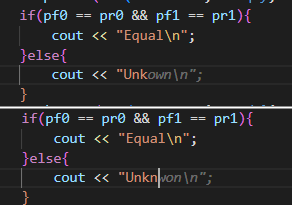Currently, Round 854 is scheduled to be on a Monday, when I imagine a lot of people have work/school obligations. Is this because of the planned server maintenance? In any case, it feels rough since we're in a bit of a Div. 1 drought. I know contests are rarely moved, but in my opinion, it would be better to postpone the contest for the weekend.
| # | User | Rating |
|---|---|---|
| 1 | ecnerwala | 3649 |
| 2 | Benq | 3581 |
| 3 | orzdevinwang | 3570 |
| 4 | Geothermal | 3569 |
| 4 | cnnfls_csy | 3569 |
| 6 | tourist | 3565 |
| 7 | maroonrk | 3531 |
| 8 | Radewoosh | 3521 |
| 9 | Um_nik | 3482 |
| 10 | jiangly | 3468 |
| # | User | Contrib. |
|---|---|---|
| 1 | maomao90 | 174 |
| 2 | awoo | 164 |
| 3 | adamant | 161 |
| 4 | TheScrasse | 159 |
| 5 | nor | 158 |
| 6 | maroonrk | 156 |
| 7 | -is-this-fft- | 152 |
| 8 | SecondThread | 147 |
| 9 | orz | 146 |
| 10 | pajenegod | 145 |
I'm sure this has been asked to death but I can't find any great answers. I'm not really sure there are any. I know about clist.by and a few alternatives (most of the alternatives I've seen seem to list a strict subset of clist's contests though). In particular I'd be interesting in finding out about one-off competitions held by a company or university. Recently there were a few that I only stumbled upon by chance, like the Buckeye Programming Contest or the (admittingly flawed) Credit Suisse competition. Ideally I'd like some way of finding out about these without needing to hear from a friend.
Also I've noticed a pretty frustrating trend of a blog being made on Codeforces that only gets a lot of upvotes and comments by people who just did the competition, so I end up finding out about a competition right after it's over. Is there a good way to filter for contest announcements on Codeforces?

Abandon thy false gods; Copilot will not save thee.
The runtime for this algorithm is $$$O(n^3)$$$, but I've seen at least two problems where the intended solution is using this algorithm and $$$N = 1000$$$. (The ones I'm thinking of are: https://open.kattis.com/problems/engaging and https://open.kattis.com/problems/cordonbleu ). It runs in under 1.5 seconds for both. That's about 7 times faster than I'd expect if we actually had to use $$$1000^3 = 10^9$$$ operations. My main concern is being able to estimate how long the algorithm will take to run, in a contest setting. Is it possible to generate a worst case where we need all $$$n^3$$$ operations? Does this algorithm have a provably low-constant factor for being $$$O(n^3)$$$? Or is it like a flow problem, where we can say a strict upper-bound and know that the algorithm will usually out-perform this estimate, but it's harder to give a precise estimate? Given what I know about the similarities with flow, I'm guessing it's the latter, but I wanted to ask if there's a better way to estimate how long this algorithm will take to run.
(Just FTR I've read the KACTL implementation, and kind of understand how it works, but it's not obvious how many times that inner while loop is called while updating potentials).
Sometimes when you are contesting and problems are accepteding, round becomes unrated. Very much sad thing to happen! If rated contest becomes unrated makes people sad, then unrated contest becomes rated should make people happy! Ver y exciting news indeed. Now when you are doing well in contesting, but is unrated for you, it can be surprise rated and you surprise be happy :)
| Name |
|---|










